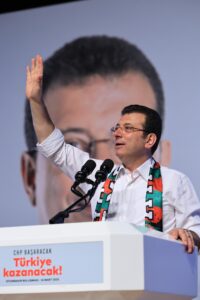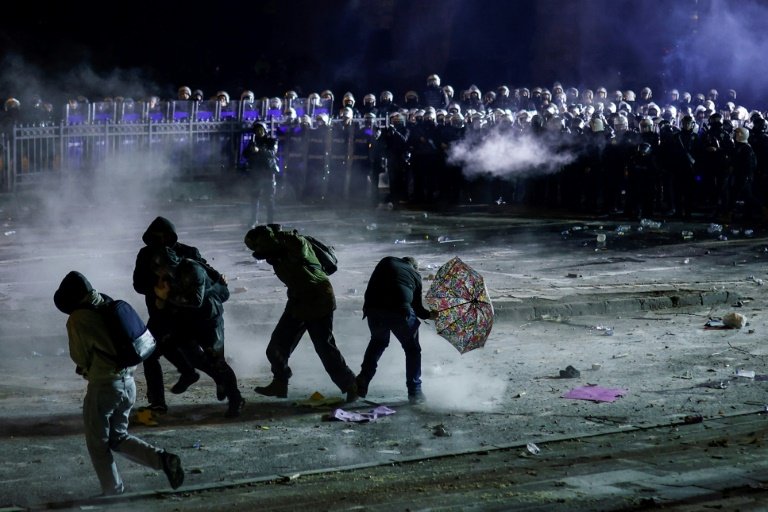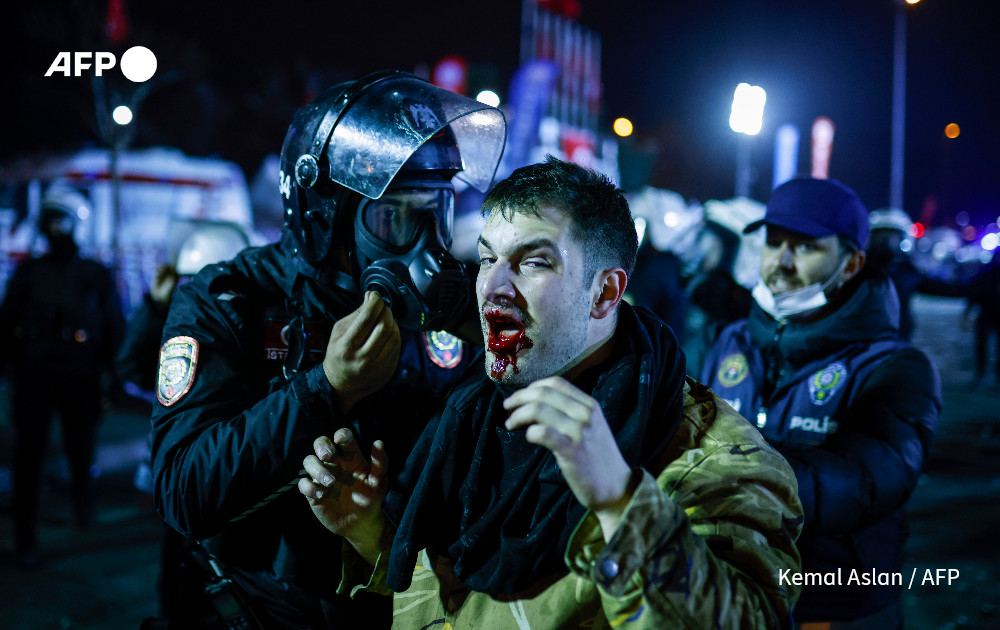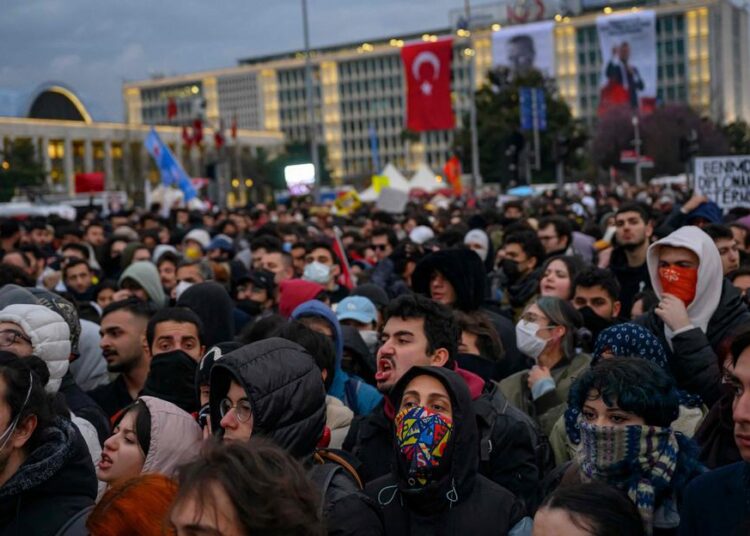Levent Kenez/Stockholm
Thousands of people took to the streets across Turkey, primarily in Istanbul to protest the detention of main opposition Republican People’s Party (CHP) presidential candidate, İstanbul Mayor Ekrem İmamoglu, who was taken into custody on March 19 and formally arrested on March 23. According to official figures announced by Interior Minister Ali Yerlikaya, at least 1,418 people were detained by police in connection with the protests. The majority of those taken into custody were university students.

Many of the young protesters were not detained during the demonstrations themselves but were instead apprehended in their homes during early morning raids in the following days. Experts say this raises questions about how police were able to identify and locate these individuals in such a short period of time. One possible explanation, they suggest, is the use of facial recognition technology by Turkish police. Although not officially acknowledged due to the lack of a clear legal framework, these systems may be quietly in use. The fact that individuals with no criminal record could be identified through facial data supports this possibility.
Footage and eyewitness accounts indicate that police removed face coverings from demonstrators and recorded close-up images of them, actions that further strengthen suspicions about the use of facial recognition to retroactively identify protesters.
In response to concerns over the rapid escalation of protests, the Security Directorate General moved quickly following İmamoğlu’s arrest. Just one day after the operation targeting the opposition figure, the agency announced a series of procurement tenders. According to public records, the police sought to purchase 13,000 facial recognition cameras, 280,000 electronic ankle monitors, 10,000 cans of pepper spray, 100,000 tear gas cartridges and 50,000 smoke grenades. The timing of the tenders has further fueled suspicions surrounding the use of surveillance technologies during the protests.

Experts say the proximity of the time of these tenders to the protests supports claims that Turkish law enforcement is expanding its monitoring capabilities to suppress dissent more effectively. The absence of transparent legal oversight of these systems continues to raise concerns among rights groups.
Minister Yerlikaya has yet to respond to a question from opposition lawmaker Ahmet Şık, who asked whether police used a mobile application known as KİM during the identification and detention of protesters.
The existence of the KİM app first came to public attention in 2023, when then–interior minister Süleyman Soylu appeared in a video interview with a technology blogger. During the interview Soylu demonstrated the app on his personal smartphone. While discussing the advanced tools used by law enforcement, he took a photo of YouTuber Hakkı Alkan. Within seconds, Soylu’s screen displayed Alkan’s full identity information including his address.
“This state has immense powers. What I just showed you is only one hundred-thousandth of it,” Soylu said in the video.
The demonstration sparked widespread backlash from legal experts and opposition politicians, who criticized the app for allegedly violating data privacy laws and enabling unlawful surveillance. Despite public concern, no official legal framework regulating the app’s use has been introduced.
Lawyers representing the detained protesters say their clients were taken into custody despite not engaging in any acts of violence or damage to public property. They argue that the sole basis for the arrests was the individuals’ participation in the demonstrations and that there is no concrete evidence of criminal activity.
Main opposition leader Özgür Özel echoed these concerns during a statement he gave on April 10 after visiting İmamoğlu in prison. He said a significant number of the detained youths were individuals who had joined the protests in the evening and were taken into custody at their homes the following morning.

Minister Yerlikaya had earlier announced that all police officers in Turkey would be equipped with body cameras by 2025 and that the devices would include integrated facial recognition technology developed by state-owned defense contractor ASELSAN.
Speaking on CNN Türk on February 28, 2024, Yerlikaya said the new system aimed to enhance transparency, improve oversight and enable real-time monitoring of police interactions.
“Starting in 2025, every police officer will wear a body camera,” Yerlikaya said. “All interactions between police and citizens will be recorded. ASELSAN has developed these cameras, and they now feature facial recognition. While officers are checking documents, personnel at the central command center will monitor the footage. If a wanted individual is identified, intervention will be immediate.”
The system will allow command centers to monitor camera footage live and respond instantly to incidents. It will also streamline evaluation of citizen complaints and officer performance, the minister added.
Nordic Monitor previously reported that Turkish police had used facial recognition systems for a long time to spy on citizens, and newly uncovered documents confirm that this technology has become a routine tool for political repression.
In one case, police in the western province of Aydın used facial recognition software to identify 43 people — including 10 women — who had participated in a peaceful demonstration in 2014 against the detention of Zaman newspaper’s editor-in-chief, Ekrem Dumanlı. The software was later employed to track union members protesting the closure of private prep schools affiliated with the Gülen movement, a group critical of Turkish President Recep Tayyip Erdogan. These cases illustrate how a technology ostensibly developed to identify terrorists has been weaponized to criminalize constitutionally protected dissent.
The Turkish government has aggressively tried to procure surveillance technology from abroad in order to track the movements of critics. Forbes published an exclusive story in October 2016 that reported how Swedish engineers rebelled against the California-based Procera Networks, which landed a $6 million contract with a Turkish government-controlled telecom firm. The contract included surveillance of subscribers’ usernames and passwords for unencrypted websites, their IP addresses, what sites they’d visited and when.
Swedish engineers who worked in Malmö, a city in the south of Sweden, had grown concerned that they were being asked to turn innocent tech into an evil surveillance tool and hand it to a regime that had become increasingly repressive.
The United Kingdom is among the top providers of surveillance technology to Turkey despite widespread violations of human rights by the Erdogan government, which stifles dissent, suppresses critical voices and is currently incarcerating close to 200 journalists. Vice News reported in July 2017 that the UK exported surveillance technology to Turkey that may have directly aided the Turkish government in punishing opponents, critics and journalists.












